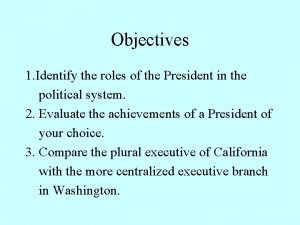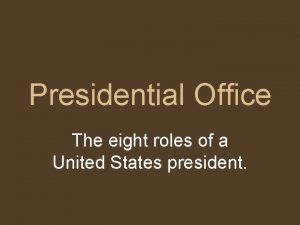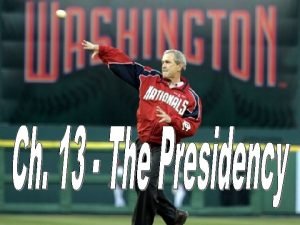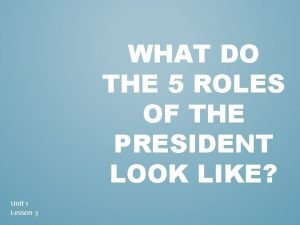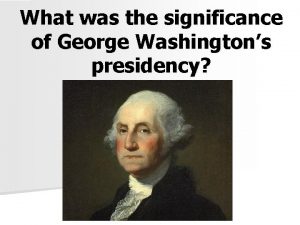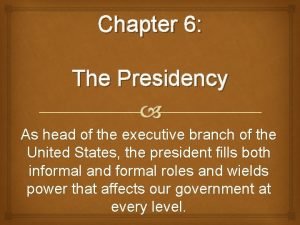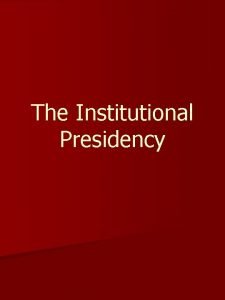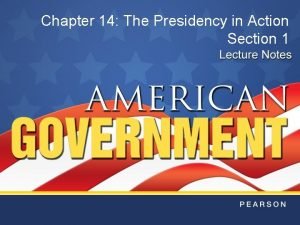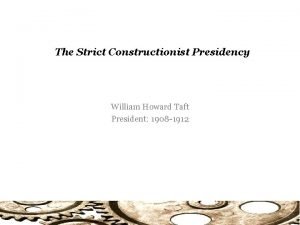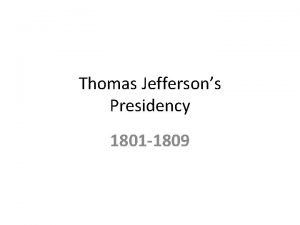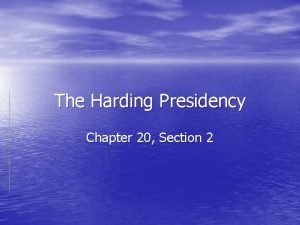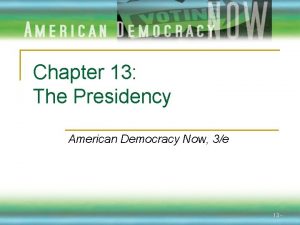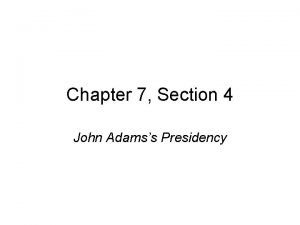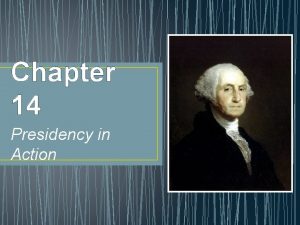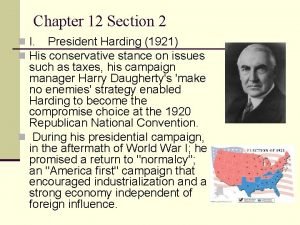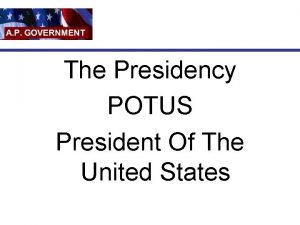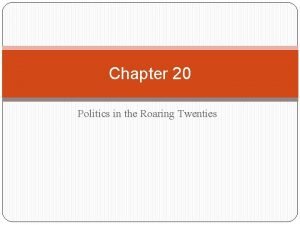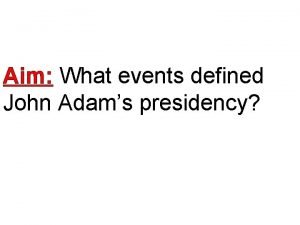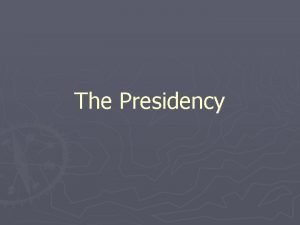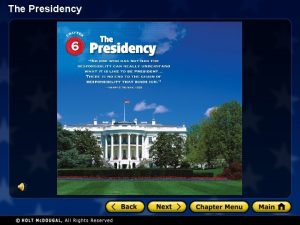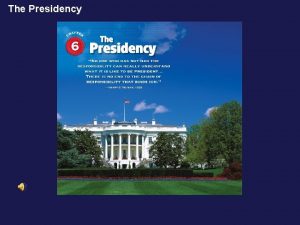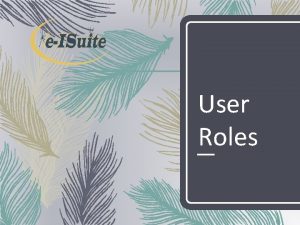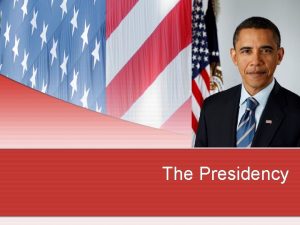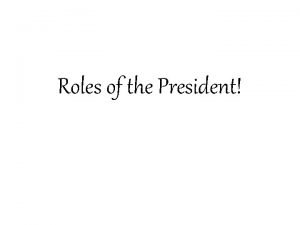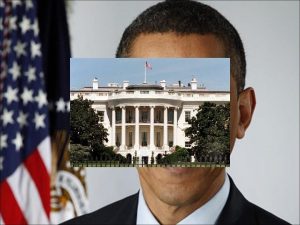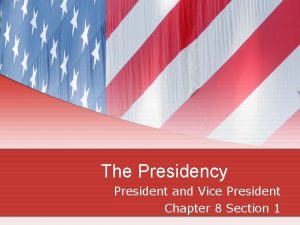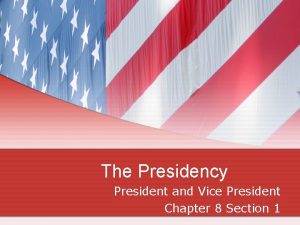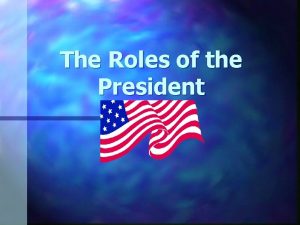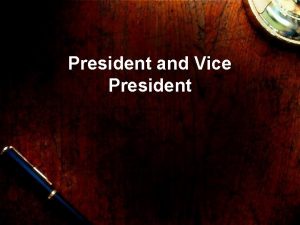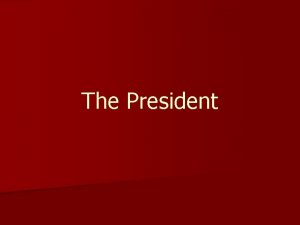The Presidency The Presidency Roles of the President





















- Slides: 21

The Presidency

The Presidency Roles of the President The presidency is one of the most complex jobs in the world. The person who sits in the Oval Office fills a variety of roles, some of which are stated in the Constitution, and some of which have developed over time. Official Roles • DUTIES OUTLINED BY ARTICLE II OF CONSTITUTION • Chief executive • Chief administrator • Commander-in-chief • Foreign policy leader • Chief agenda-setter • Chief executive: to see that government programs are carried out and laws passed by Congress are implemented • As chief administrator, manages fifteen executive departments employing about 1. 8 million people

The Presidency • COMMANDER-IN-CHIEF – LEADER OF NATION’S MILITARY • Has authority to order troops into action, call them home • Congress has duty to declare war • President frequently sends U. S. forces into action without declaration of war • FOREIGN POLICY LEADER – FORMULATES NATION’S PLANS FOR DEALING WITH OTHER COUNTRIES, HOSTS DIGNITARIES IN U. S. • Directs U. S. diplomatic efforts • Diplomacy – the art of negotiating with foreign governments • Chief agenda-setter – SETS GOVERNMENT’S AGENDA DURING ANNUAL STATE OF THE UNION ADDRESS • HELPS CONGRESS PREPARE ANNUAL FEDERAL BUDGET

The Presidency Formal Characteristics of the Presidency In addition to the roles of the president, the Constitution lists the qualifications, term of office, election, succession and benefits for the position. Formal Qualifications • Only three formal qualifications listed in Constitution • MUST BE AT LEAST 35 YEARS OLD • MUST HAVE LIVED IN U. S. FOR 14 YEARS • MUST BE NATURAL-BORN CITIZEN Natural Born Restriction • Framers saw requirement as safeguarding gains of American Revolution • No foreign royalty could come to U. S. and claim presidency • Some feel requirement unnecessarily blocks qualified people, seek amendment to eliminate provision

The Presidency Formal Characteristics (cont’d. ) Term of Office • Different term lengths considered by Framers • Compromised on four-year term, chance for re-election • WASHINGTON SERVED TWO TERMS, RETIRED; BECAME UNOFFICIAL LIMIT • 1940: Roosevelt broke tradition, ran for third, then fourth term • 1951: 22 AMENDMENT, LIMIT TO TWO FULL TERMS, NO MORE THAN 10 YEARS

The Presidency Informal Qualifications for the Presidency Presidential Backgrounds Many common features among former presidents: • Well-educated white men from middle- to upper-class families • Religious background in some Christian denomination • Most were lawyers • Only Clinton, Obama and Trump never served in Armed Forces • 2016: Neither HRC or Trump had military service • Four recent presidents served as state governors

The Presidency Succession • VICE PRESIDENT FIRST IN LINE OF SUCCESSION TO PRESIDENCY • SUCCESSION: PROCESS OF COMING AFTER SOMEONE • Constitution unclear whether vice president becomes president, or just acts as president – 1841: VP John Tyler succeeded William Henry Harrison. – Assumed duties and title – 1967: 25 TH AMENDMENT MADE CUSTOM CONSTITUTIONAL • Other guidelines – Vice president is acting president in cases of temporary illness. – SPEAKER OF HOUSE NEXT IN LINE AFTER VP

The Presidency

The Presidency Unofficial Roles • Chief of state—symbolic figurehead of United States • Represents U. S. at major events abroad • Hosts state dinners foreign dignitaries • Party leader—official leader of his/her political party • Helps shape, promote party platform—the important issues for which party stands • May help raise money, build support for party and party members • Chief citizen • President, vice president only two nationwide elective positions in government • Primary representative of the American people • Model of good citizenship • Held to high standard of personal behavior by American public

The Presidency Salary and Benefits • President, $400, 000 per year • Vice president, $208, 100 per year • Constitutionally, president’s salary cannot be altered during term in office • Prevents Congress from threatening to cut salary as bargaining tool or from rewarding popular president • Other benefits: – Large staff: chefs, butlers, doctors – Housed in the White House in Washington, D. C. – Health and retirement benefits, special tax deductions – Fleet of cars, Secret Service protection – Private plane, Air Force One

The Presidency

The Presidency Executive Powers As chief executive, the president has three main powers: appointing and removing of key executive-branch officials, issuing executive orders, and maintaining executive privilege. Appointment and Removal Powers • President appoints people to fill top posts in executive branch • Presidents today directly appoint some 3, 000 people. • Can use power to nominate and appoint as a political tool • About 1/3 of jobs subject to “advice and consent” of Senate • “Advice and consent” posts include Supreme Court justices, federal judges, ambassadors, cabinet members, top military advisors • Most appointees serve “at the pleasure of the president”; can be removed at any time • Exceptions: federal judges serve for life; only Congress can impeach them

The Presidency Executive Powers (cont’d. ) EXECUTIVE ORDERS • EXECUTIVE ORDERS: FORMAL RULES OR REGULATIONS ABOUT HOW A LAW WILL BE ENFORCED. • ONE OF PRESIDENT’S STRONGEST POWERS Executive Privilege • Executive privilege allows president to refuse to release information • Claim made in interest of national security • Examples: DACA; Travel Ban • Keeping sensitive information secret vital to safety of nation • Give great power to interpret Congress’s laws • Not mentioned by Constitution, but upheld by courts within limits • Used to clarify a law’s application • Nixon, Watergate an exception • May establish rules, regulations for operation of an executive agency • Case eventually went to Supreme Court

The Presidency Diplomatic Powers • President represents U. S. in interactions with foreign governments • Constitution gives power for treaties, alliances, trade relationships • PRESIDENTS CAN MAKE TREATIES: REQUIRES 2/3 SENATE APPROVAL • Power to make executive agreements between president, head of foreign government • Executive agreement does not require advice, consent of Senate • Diplomatic recognition: power to formally recognize legitimacy of foreign government

The Presidency Military Powers • President has responsibility to ensure defense, security of nation • Presidents have claimed power to take military action without Congressional declaration of war • Armed Forces called out over 200 times • Congress declared war only five times. • COMMANDER IN CHIEF (PRESIDENT) DOESN’T NEED CONGRESS TO APPROCE MILITARY ACTION

The Presidency Sequencing Under the War Powers Resolution, what must a president do first? Answer(s): If a president commits troops without congressional approval, he or she must report to Congress within 24 hours to explain the reasons for the action.

The Presidency Legislative and Judicial Powers Legislative Powers (Checks and Balances) Framers gave president some powers in both legislative and judicial branches as part of system of checks and balances: • Great power to influence Congress in role of chief agenda-setter • Proposes legislation to Congress • PRESIDENT HAS POWER OF VETO, CONGRESS CAN OVERRIDE WITH 2/3 RDS VOTE

The Presidency Legislative and Judicial Powers (Checks and Balances) • Framers gave two means of exercising judicial power: nominating federal judges; altering sentences of people convicted of crimes • PRESIDENT NOMINATES SUPREME COURT & FEDERAL JUDGES • Senate must approve and confirm all presidential nominees • Great responsibility: Supreme Court justices serve lifetime term • Justice continues to rule in a way that supports president’s agenda long after his/her term

The Presidency Judicial Powers (cont’d. ) Reprieves and Pardons Amnesty and Commutation • Reprieve postpones carrying out of sentence, jail time • Amnesty grants general pardon to group of offenders for offenses committed • Granted to give person chance to present new evidence • PARDON RELEASES CONVICTED CRIMINAL FROM HAVING TO FULFILL SENTENCE: SETS THEM FREE • To commute a sentence, means to reduce person’s sentence • Reprieves, pardons, commutations only for federal crimes; no authority over state cases • Cannot be overturned Presidential pardons, like the one granted by President Gerald Ford to former president Richard Nixon, can be very controversial.

The Presidency

The Presidency Contrasting What is the difference between a reprieve and a pardon? Answer(s): A reprieve postpones the carrying out of a person’s sentence while a pardon releases a convicted criminal from having to fulfill a sentence.
 Ducks unlimited checks
Ducks unlimited checks Predident
Predident Chief agenda setter role
Chief agenda setter role The many roles of the president
The many roles of the president Five roles of the president
Five roles of the president Lesson quiz 9-1 the federalist era
Lesson quiz 9-1 the federalist era Are executive orders informal powers
Are executive orders informal powers Institutional presidency definition
Institutional presidency definition Chapter 14 section 1 the growth of presidential power
Chapter 14 section 1 the growth of presidential power George washingtons presidency
George washingtons presidency Constructionist theory president
Constructionist theory president Thomas jeffersons presidency
Thomas jeffersons presidency Chapter 12 section 2 the harding presidency
Chapter 12 section 2 the harding presidency American democracy now 5th edition
American democracy now 5th edition Chapter 6 section 1
Chapter 6 section 1 Section 4 the presidency of john adams
Section 4 the presidency of john adams Chief of state examples president
Chief of state examples president Apush chapter 7 hammering out a federal republic
Apush chapter 7 hammering out a federal republic Chapter 12 section 2 the harding presidency
Chapter 12 section 2 the harding presidency Presidential line of succession
Presidential line of succession Chapter 20 politics of the roaring twenties
Chapter 20 politics of the roaring twenties Summary of alien and sedition acts
Summary of alien and sedition acts

